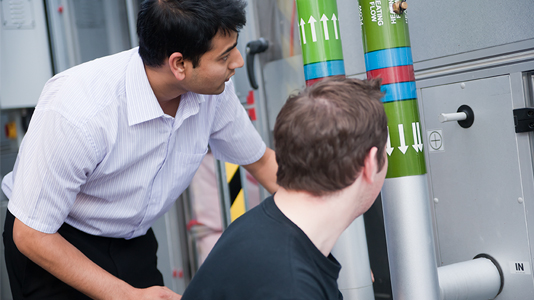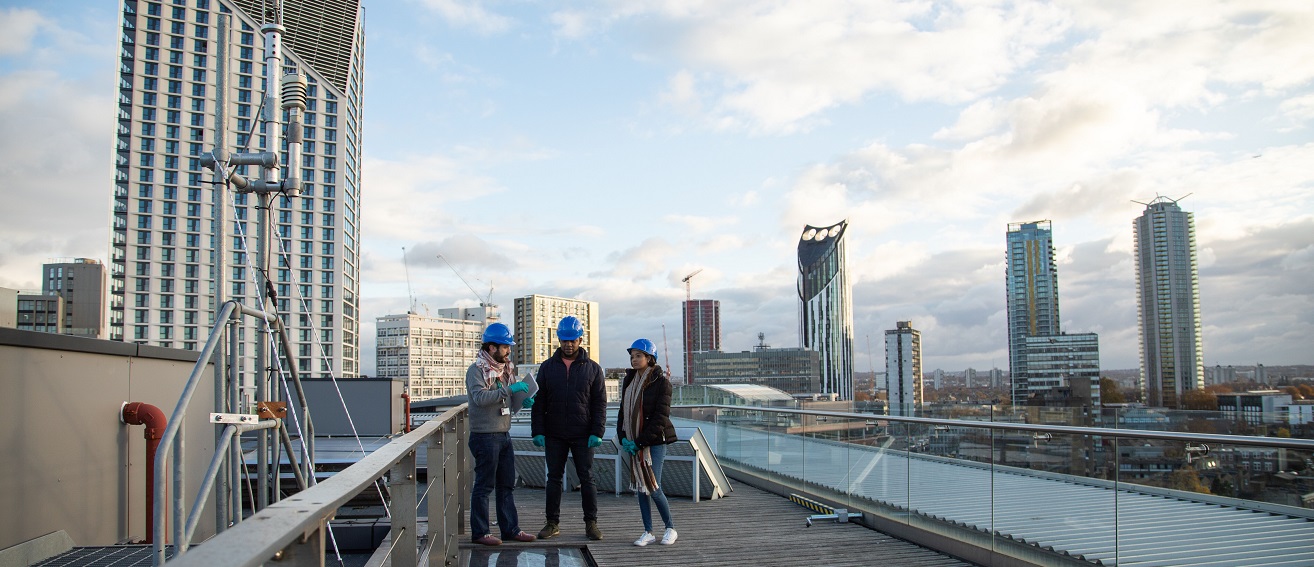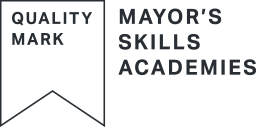Overview
70 years of expertise
The broad purpose of the occupation is to bring the built environment to life by connecting up the buildings we live and work in, ensuring they meet the needs of the people, plant, and services they need to accommodate, whilst providing comfort, building safety and security and efficiency through ever increasing environmental safeguarding.

The full apprenticeship standard and assessment plan can be found on the Building services engineering senior technician / Institute for Apprenticeships and Technical Education
Apprenticeship Employment Guidelines
Apprenticeship Evidence Pack Guidance
Why study Building Services Engineering at LSBU?
- mortar-board
- No.1 London Modern University for research intensity in Building (Complete University Guide 2019).
- university
- Heritage: we have been running courses for the building services engineering industry since 1947
- space-shuttle
- We have one of the best laboratory–workshop complexes in London.
- heartbeat
- Ranked 2nd amongst London competitors for overall satisfaction in Building courses (National Student Survey 2018).
- fa fa-users
- From AI machine learning boot camp to silent film processing, there is a range of extracurricular activities for Engineering students to get involved in.
| ModePart-time | DurationUp to 24 Months Practical Period & 12 Months EPA (36 months) | Start dateSeptember | Application code6029 | Application method Direct to LSBU |
Location
London South Bank University student union is located at 103 Borough Rd, London SE1 0AA.
If you are visiting our Southwark Campus, you may wish to use our downloadable campus map (PNG File 466 KB). For information on accessibility, see our DisabledGo access guides. See our location page for more details.
Entry Level Requirements
Want to start your course this September? call 0800 923 8888 for entry requirements.
- A Level EEE - Must include Mathematics and preferably a Science in either Chemistry or Physics (UCAS points: 48)
- T-level (Pass or above) in Construction: Design, Surveying and Planning. (UCAS points: 72)
- BTEC Level 3 Extended Diploma MPP in an Engineering subject area or Construction and Built Environment area (Must include Mathematics and Further Mathematics) (UCAS points: 64)
- BTEC Level 3 National Diploma MM in an Engineering subject area, with a minimum of merit in Mathematics and Further Mathematics. (UCAS points: 64)
- Building Services Engineering Technician level 3 apprenticeship MP (UCAS points: 48) alongside grade Pass or Distinction at EPA
- Any other technical qualifications awarded with UCAS points at a similar level supported by substantial relevant work experience , please get in contact with the LSBU Apprenticeships at apprenticeships@lsbu.ac.uk for Apprenticeships Routes
- Applicants must hold 5 GCSEs A-C including Maths and English or equivalent (reformed GCSEs grade 4 or above).
Choose your country
Select country here:
Missing English and Maths qualifications?
If you do not have the required English and Maths qualifications needed to satisfy the entry requirements for this programme, we have courses available at our partner College that you can take to upskill in these areas. Find out more at South Bank College.
Funding
The cost of the apprenticeship is paid fully by the employer (sometimes part funded by the government) through apprenticeship levy. The apprenticeship levy is a pot of money some companies pay into, which all businesses have access to spend on the training costs of apprenticeships. Companies fall into two categories: levy-payers (who pay into the pot) and non-levy payers (who do not). You can find out more in our Levy and Funding section, specifically for employers
The apprentice does not contribute toward the cost of study.
Bands
Apprenticeship standards are all assigned a funding band by the Government – these funding bands are the maximum amount the Government will fund via the levy towards a given apprenticeship standard. There are currently 30 funding bands ranging from £1,000 to £27,000.
Incentives
Employers with less than 50 staff sending an apprentice aged 16-18 will have 100% of the training costs paid by the government. All employers who employ an apprentice aged 16-18 on the first day of teaching will receive a £1,000 incentive from the government. You can find out more in our Levy and Funding section, specifically for employers.
Cost
You can find out the funding band for an Apprenticeship Standard on the Government website. To find out how much we are charging, please get in touch with us at apprenticeships@lsbu.ac.uk
Field trips
Some modules include field with and site visits, which may be residential or outside the United Kingdom, ranging from three to five days. These are organised by the Division and students are required to contribute towards the cost. If there are any field trips or any course visits as part of your course, we will let you know in good time.
Home
| Mode Part-time | Duration Up to 24 Months Practical Period & 12 Months EPA (36 months) | Start date September | Application code 6029 | Application method Direct to LSBU |
An Apprenticeship Standard is comprised of a programme of study, an End Point Assessment and on-the-job learning. This means that in addition to meeting academic requirements, you’ll need to be employed in a role related to your apprenticeship. The process of applying depends on whether you have an employer to sponsor (and support) you.
If you are employed and your employer has confirmed they will support your apprenticeship:
You are welcome to submit an application via our application system. You’ll need to provide details of your employment/employer as part of the application. You’ll also need to ensure you and your employer meet the requirements – find out who can be an apprentice to see if you meet the entry requirements and employer commitments to find out more about your employer’s role.
If you are not employed:
- You will need to find a job role related to the apprenticeship you wish to apply for, with an employer who is happy to support you. If you would like to find an employer to support your apprenticeship with LSBU, you can search which employers are currently advertising Apprenticeships via the National Apprenticeship Service website searching for ‘London South Bank University’ as keywords.
- If there are no search results, this means there are currently no vacancies. We update our vacancies regularly, so please do check back regularly.
- Many employers advertise their apprenticeship vacancies on their websites or via other portals. You could search for ‘find an apprenticeship’ online.
- When you’re ready to apply, see the government's advice on how to write a winning apprenticeship application and make your application.
Further information for apprentices
If you’re a prospective apprentice, you can find out more about who can be an apprentice on our student pages.
Further information for employers
If you’re an employer, you can find information about the employer commitments and further related information on the related pages for business.
See our admissions policy 1.0 MB and complaints policy 516.0 KB.
Prepare to start
There are steps the apprentices, the employer and the University need to complete before you start your course. Take a look at the steps to be completed in the Enrolment section. Employers may also like to look at our steps to offering an apprenticeship.
Level 4 modules contain a broad mixture of mechanical and electrical services together with management and supporting maths and science.
Year 1
- Fundamentals of Building Services Engineering
The module is an introduction to various services in a building (domestic, non-domestic), the general concept of Building Service Engineering Systems, Introduction to building comfort, Mechanical System, Electrical System and Public Health. It also covers the role of the building services engineer in designing and delivering sustainable buildings services engineering systems, the Impact of Building Services on Design of Buildings, the role of the building services engineer in a design team and collaborative interaction therewith. Assessment methods: Coursework 1 (50%); Coursework 2 (50%) - Building Services Engineering Principles B
This module covers the underpinning skills, engineering and science principles relevant to mechanical and electrical building services engineering. The materials in this module are divided into two major parts: thermofluid principles (mechanical part) and electrical principles (electrical part). Assessment method: 100% exam. - Engineering Mathematics B
This module is delivered over two semesters and consolidates the mathematical skills that underpin all the BEng and HND/HNC Building Services engineering courses. It is specifically designed to cater for the wide differences in mathematical background of students to reach an equivalent A-Level Mathematics and then extending it by introducing the main mathematical techniques which are required at the early stages of the Building Services Engineering qualification. Assessment methods: 50% coursework; 50% exam.
Year 2
- Construction Practice B
This module provides building services engineering students with the knowledge of the interrelationships between industry, professional bodies, education and understanding of the key professional requirements. The skills acquired by students on the module will provide them with a roadmap for their professional career development and enable them to prepare for employment in the construction sector working together with other construction professionals. Assessment methods: Coursework 1 (25%); Coursework 2 (25%); Coursework 3 (50%). - Internal Environment and Comfort B
The module introduces the concept of comfort in a building indoor environment in terms of the thermal, lighting and acoustics. It examines the parameters that affect each of the areas of comfort, how these parameters are affected by the external environment, and it introduces ways of satisfying comfort requirements. Awareness of sustainability and carbon footprint considerations are embedded in the teaching and assessment. The course work provides students the opportunity for practical application of theory in a group work setting, develop independent learning, project management with implementation of health and safety risk management. Assessment methods: Coursework (50%); Exam (50%). - Heating and Ventilation Design
The module introduces heating and ventilation systems in buildings. On heating systems, focus is on LPHW systems operation and controls, efficiency, heat generators, DHW, heat emitters, pipe sizing, heat recovery and heat networks. Sustainable and low carbon heat generation systems such as heat pumps, CHPs, and solar thermal for LPHW systems are covered. On ventilation, mechanical (active) and natural (passive) ventilation systems along with their requirements, design considerations, system components, and sizing are considered. The innovative and design aspects of the module ensure use of intellectual skills for energy efficient, sustainable heating and ventilation system design towards net zero. Assessment method: 100% coursework.
Careers
Employability Service
By completing the apprenticeship route, you’ll have the advantage of having real-world work experience, working in a role related to your area of study. This will give you a competitive edge among other graduates when you complete your apprenticeship standard.
During your studies – and for two years after you graduate – you’ll have access to our Employability Service, who can help you develop your skills through the Careers Gym workshops and presentations. Our JobShop advisers support students and graduates with finding the right job for them.
We are University of the Year for Graduate Employment - The Times and Sunday Times Good University Guide 2018.
Benefits of the apprenticeship standard route
By studying the apprenticeship route, you gain real world work experience combined with a better understanding and analysis of your daily tasks, building skills and contacts, giving youthe edge on graduation.
Role
Typical job titles can include: Assistant Project Engineer, Assistant Engineer or Building Services Site Technician.
In the case of SME building contractors, the roles are likely to include Assistant Project Managers, Project Managers and Site Managers.
This apprenticeship is designed to create highly skilled employees who can contribute to the success of complex construction projects by demonstrating key aspects of the installation of building services equipment, such as mechanical and electrical services, and coordinating site activities as well as contributing to wider project objectives.
Building services engineering technicians work on construction sites and, as well as being able to deliver their own technical responsibilities, they supervise a workforce and ensure their safety and the safety of others. There is also some liaison with third parties such as design teams, clients and statutory authorities.
Due to the technical nature of the role it is essential that apprentices are educated and trained to a level and breadth that exceeds that of the trades-based workforce that they are coordinating. Successful completion of the Apprenticeship Standard demonstrates that the apprentice has the skills and behaviours to work competently as a technician.
The on-the-job element of your apprenticeship will give the opportunity to work and network with other professionals in the industry.
We have been running courses for the building services engineering industry since 1947. In that time we’ve built up a lot of industry contacts. Our close links with industry ensure that our course is up-to-date with their needs – and this means our graduates are in demand.
BSEIAB (Building Services Engineering Industrial Advisory Board)
Our partners help our academic staff to maintain a balance between academic requirements and up-to-date industrial practice with regular meetings and visits to their companies.
Teaching and Assessment
Duration
The academic programme lasts for 2 years. The End Point Assessment (EPA) is a further 3-6 months.
Assessment
Assessment of the academic element of this apprenticeship will consist of course work, exams and timed assessments. There will be formal lectures, study guides, course notes, directed reading, class tutorials, assignments and small-group projects.
End point assessment
The apprentice will be expected to demonstrate through both a presentation-style response to a technical project brief and a structured interview informed by a written report, that they have acquired the knowledge and behaviours to undertake the role of a building services engineering technician.
The assessment organisation will ensure their assessment process is aligned to the Engineering Council Engineering Technician review process.
Throughout the EPA, the apprentice will need to include how they have, or would, use Building Information Modelling (BIM) to access and work with data.
| Lectures, seminars and workshops | Self-directed study | |
|---|---|---|
| Year 1 | 26% | 74% |
| Year 2 | 26% | 74% |
Personal Tutoring
As a Built Environment and Architecture student, you will be allocated a named tutor during your first three weeks at LSBU. The role of your tutor is to be your primary contact for academic support. Your personal tutor will be the same person throughout your course.
Your tutor will support you to get the most of your time at LSBU, providing advice and signposting to other sources of support in the University.
Your tutor should be the first person at the university that you speak to if you are having any difficulties that are affecting your work. These could be academic, financial, health-related or another type of problem.
You will have meetings with your personal tutor periodically. One-on-one meetings can be arranged on request. You can contact your tutor for additional support by email or in person.
People profiles

Register your interest
Apprentice Guide
Download our guideContact information
Course Enquiries - UK
Tel: 0207 815 7500



